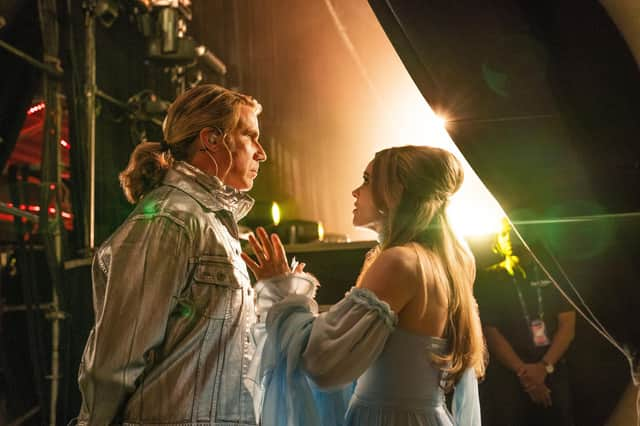Aidan Smith: Don’t be Middle of the Road about this, send Eurovision to Glasgow


It won’t even have to resort to what snidey cynics would term its time-honoured challenge to having honour impugned. There will be no need for “You got a problem wi’ that, pal?” because the credentials here are impeccable and irresistible.
The UK doesn’t win Eurovision many times and our recent record has been abysmal but in 1969 Dennistoun diva Lulu topped the voting with “Boom Bang-a-Bang”. (Okay, three other countries shared first place that year but have you got a problem wi’ that, pal?).
Advertisement
Hide AdAdvertisement
Hide AdGlasgow - and its Hydro - was the venue for the contest in Netflix’s Eurovision comedy, The Story of Fire Saga, which starred Will Ferrell as a cuckolded Icelander in a shiny snow-white bodysuit singing: “My love for you is growing wide and strong.”
Beyond music, it’s put on a show many times, unfazed by the events’ size and prestige. In football, its three European Cup finals are all highly notable: 1960 (the greatest-ever game), 1976 (the greatest-ever swally with 1,000 pubs granted licences to stay open until 3am) and 2002 (the greatest-ever goal).
Glasgow staged a terrific Commonwealth Games in 2014, silencing the stand-ups who joked the city would be an ideal setting for the shooting events but not much else. It can do serious (COP26) and it can also do camp (the Commy Games’ opening ceremony featuring a hundred prancing Tunnock’s teacakes).
Let’s get back to music. Abba are the supreme Eurovision act, but do they namecheck Birmingham, Leeds, Liverpool, Manchester, Newcastle or Sheffield in any of their chartbusters? No, they don’t, but Glasgow gets this honour.
And, who knows, maybe there wouldn’t be an Abba if there wasn’t first a Middle of the Road. You’ll remember them: “Last night I heard my mama singing a song … ” That was their big hit, “Chirpy Chirpy Cheep Cheep”, a UK No 1 in 1971 and massive pretty much everywhere else, too, including Sweden, where the not-yet-formed Abba were listening and learning.
Middle of the Road tend not to feature in big, fat, serious tomes about popular music but author Will Hodgkinson has found a place for them in In Perfect Harmony - Singalong Pop in 70s Britain (Nine Eight Books), his epic, 567-page study of a period when the charts were at their chirpiest.
As a junior music snob I’ll have scoffed at its toytown tunefulness and banal lyrics (while secretly fancying the blonde, hot-panted singer, Sally Carr). In the 1979 Scottish Cup final at Hampden Park, the band were driven round the pitch as the pre-match entertainment and I’m sure I turned to my father and showed off my critical faculties thus: “Can you believe, Dad, that they’re still banging out that terrible song?” When recalling that performance, I’ve always described the mode of transport as a coal lorry, but can admit now this was just a cheap shot, a cheep cheep one.
Hodgkinson rehabilitates both band and song. “A group of working-class Scots … a transcendental fluffy cloud of magic pop dust,” he writes. Carr, now 77, has spoken in the past of how Abba’s Benny Andersson and Bjorn Ulvaeus borrowed key components of the Middle of the Road sound - female voices prominent and friendly melodies - for their songwriting and arrangements, and how Agnetha Faltskog had recorded a couple of Middle of the Road tracks before joining the Super Troupers. And as Hodgkinson goes on to explain, maybe Abba embodied Europop better than anyone else, but the combo from Glasgow were the true pioneers.
Advertisement
Hide AdAdvertisement
Hide AdEuroscepticism is not a recent phenomenon. It was around prior to Ted Heath taking Britain into the EEC in 1973 and for a good bit after. Jim Callaghan warned that entry into the Common Market would result in a “complete rupture of our identity”, while Enoch Powell predicted an “irreversible alienation of our separate sovereignty”.
But Middle of the Road shrugged off such concerns. Indeed, according to Hodgkinson, they were “so removed from drab British reality” by the time Top of the Pops booked them to perform their cheery chart-topper that the show’s dancers were wondering which part of Italy they were from. Recalled Carr: “I replied in my best Scottish: ‘Glasgow.’”
A cabaret residency with the Rio Stakis hotel chain had led to Opportunity Knocks, which the band won, and this brought an opportunity to tour Argentina. But their cruise ship only made it as far as Italy after a gambling habit got on top of the promoter who bolted, leaving Middle of the Road not just with a pile of unpaid bills but also the man’s wife and son.
Enter, incredibly, Sophia Loren. Our intrepid quartet were working as a backing band for various Italian singers to settle their debts - and repatriate the stranded family - when the screen sex goddess heard them in a nightclub on a hill above Rome. Loren asked them to back her on a spin-off song from her film The Priest’s Wife, which only enhanced their continental credentials some more.
Maybe these arrived by accident rather than design. Who knows how the band’s career would have panned out if they’d made it to Argentina under their old moniker, Los Caracas. Maybe not too well, for the name makes me think of Gregory’s Girl and the doomed efforts of the two lads trying to hitchhike to South America from a Cumbernauld roundabout, with the Venezualan capital spelled wrongly on a piece of cardboard.
But as Middle of the Road Abba owe them a debt. And I think the pop icons behind the immortal line “When I called you last night from Glasgow” would reckon their inspirations’ home city to be perfect for Eurovision 2023.
Comments
Want to join the conversation? Please or to comment on this article.